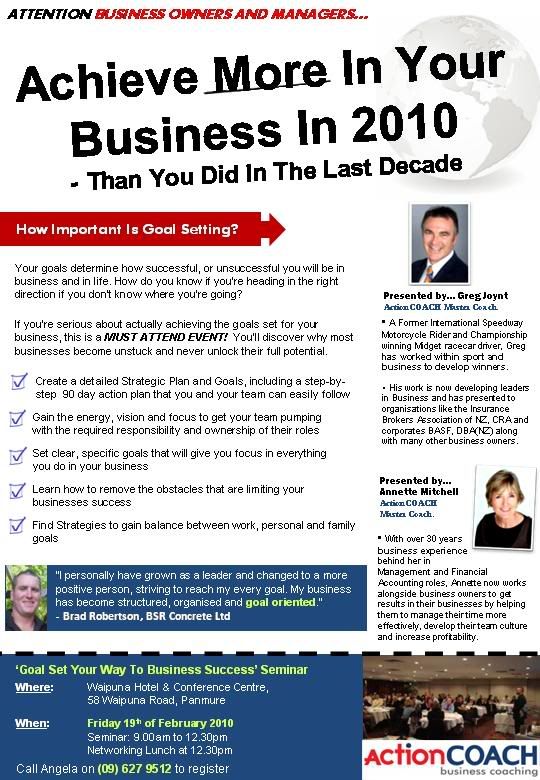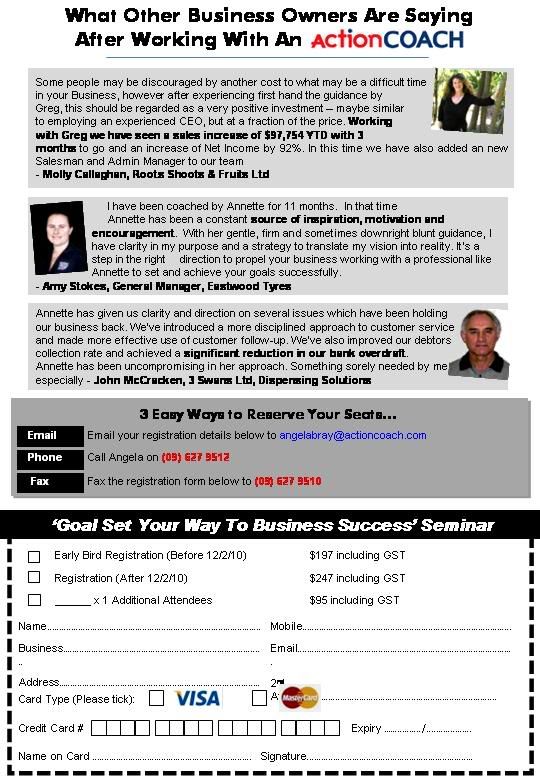
Click Here to Reserve your Seat.
Limited seats available.


1. The Lifestyle of your choice…
In a job, you have to turn up at 9 (usually earlier) and can only leave at 5 (or later). In your own business, you set the schedule. Successful business coaches can arrange their work to suit them. You can work 3 days a week and take holidays when you want. It’s all up to you…
2. The rewards are yours to keep…
In a job, you usually get paid a fixed amount every year no matter how well you do. In a business it’s different, you get paid exactly what you deserve, because you earnt it…
3. The freedom of being an entrepreneur…
In a job, you have to fit your life around your work. Being a business owner is very different. You choose everything. Your Clients, your office and you hours are up to you. You are in control…
____________________________________________________________________________
ActionCOACH Business Coaching New Zealand
The World’s No.1 Business Coaching Firm
Call us FREE Today for a Complimentary Business Coaching Session- 0800 228 466
or Click Here
How many times have you played the “Whatever Happened to …” game. Wondering why a certain customer who used to buy what you have to sell doesn’t buy anymore?
Is there a reason? Or group of reasons? Has anyone ever done a study on this?
Though the years, I’ve accumulated a group of reports from different sources ranging from different sources ranging from U.S News & World Report, the Harvard Business Review, and several trade magazines to half a dozen motivational and “secrets of successful selling” articles. But (and here’s the amazing fact) they all have the same statistics.
Now whether this is one person copying what someone else has written or said or simply perpetuating a myth I’m not sure.
What we are sure of is that the statistics make sense because they worked in our business (and seeing them gave us a reason to develop a new customer-oriented marketing plan) and in other businesses as well.
Here are the numbers as repeated in books, columns, and from the mouths of let-me-tell-you-how-to-succeed speakers:
Why Customers Leave …
· 14% leave because their complaints were not solved
· 9% leave because of the competition
· 9% leave because they moved someplace else
· 68% leave for … no special reason or what we call perceived indifference …
In other words: Seven out of ten customers who used to buy from you left for … no special reason … I don’t believe that … I think there was a reason … Or a series of reasons:
I think they left because you never told them you cared…
I think they left because you never told them they were important
I think they left because you never said “Thank you” and “Please come back and shop with us again …”
Many times I have found that owners and operators are so busy minding the business they forget to mind the Customers, and in the immortal words of super salesman “Red” Motley, “Nothing happens until a sale is made”…
How many times have you walked in to the store and found no one to give you any help or assistance?
I heard the story of writer Ken Erdman tells of the time he and his wife were shopping in a Philadelphia department store … His wife found an item and brought it to the counter – but no one was there. And no one to be seen … And so Ken simply stood in the middle of the room and yelled at the top of his voice “Help! Help!” Suddenly security people appeared from everywhere demanding to know the problem…
“There’s no problem,” said Ken. “We just want someone to help us.”
The Japanese handle that by having People stationed on either side of the door when you walk into their shops … They bow and say O-kyaka-san, which roughly translated means, “You are a visitor to my home.”
Do I feel that way when I walk into your business? Is one cashier talking to another … Or a friend on the phone … Or busy fixing stock … Or … are they so busy minding the business, they forgot to mind the customer …
A retailer friend proudly showed us his new computers … He could tell us how many pairs of pink socks were sold on any given day at any given hour … His carry-home briefcase was filled with voluminous printout sheets that he read with the same interest and the newest novel by John Grisham … He would pencil in notes on the margin, make references for future buying patterns, and the store as an office away from his office at home …
His once-successful business went bankrupt …
He was so busy minding the business, he forgot to mind the Customer …
Now nothing is wrong with cleaning stock, taking inventory, and buying computers … It is to be practiced devoutly, to be admired, and encouraged. But not at the expense of the Customer … Businesses often tend to build fences to hide behind …
We did a series of seminars for banks at annual state meetings across the country. We asked each of them, “How many made more than ten officer calls last month?” (“Officer calls” mean the bank officers had to leave the bank and personally make a call on a Customer and potential Customers throughout the community.) Few raised their hand. Yes, it was written down for them to do … Yes, they knew it was important … But there were papers to read and sign and employees to watch and criticize and . . . well, there just wasn’t enough time …
We remind them to “take the time,” or the competing bank would be out asking a simple question to the Customer: “When was the last time you saw your banker?”
They were so busy minding the business, they forgot to mind the Customer …
And what of the phone call to a business questioning a bill … And the answer, “Sorry, our computer handles that.”
Really? What’s his (or her) name? Can I talk to him? If the computer is going to take care of the business, does that mean it takes care of the customer as well? Shall we set up your business like a vending machine cafeteria? Customers come in, look for the selection they want, dial their credit card number alongside the tiny window opening, and click . . . it opens for them to take what they want …
And those of you that rave about the tremendous success of home shopping on TV, consider this fact: The total sales (while impressive) make up less than 3 percent of the total retail in the United States …
· People are lonely … They want someone to talk to …
· People are critical … They want to kick the tires and touch the fabric …
· People are social … They want to “get out of the house” and go somewhere . . . the local mall or business is fine …
And so the next time the desk piles up with figures to beat and merchandise to buy and salespeople to hire, make sure it does not take up the greater part of your day … That belongs to the Customer outside your door roaming around looking for help in buying an item …
Take care of your Customer. If you do, you will have a business to take care of …
***article from bradsugars.com***
Do you have what it takes to become a Business Coach?
ActionCOACH Business Coaching New Zealand
…at ActionCOACH we give ordinary people extra ordinary opportunity to have a more abundant life.
Do you post to message boards, e-mail discussion
lists, classified ads sites, FFA sites or newsgroups?
People will usually read the subject line before they
read your ad or message, so it’s important they get
noticed. Below are ten simple, but powerful tips to
get your ads or messages noticed.
1. Use extra white space creatively in your subject
line. You can add extra blank spaces between your
words or letters.
2. Combine capital letters with lower case letters.
Use all capital letters in every other word or use a
capital letter between every other lower case letter.
3. Add text symbols in your subject line. You could
use them between words and letters. Start and end
your subject with a text symbol. ( *, $, >,{,] )
4. Begin your subject line with the word “STOP!”.
People have been trained their whole life to stop
what they are doing when they see that word.
5. Ask people a question in your subject line. We
all went to school and were repetitively branded to
answer questions.
6. Use the word “FREE” in your subject line. Your
offer should be attractive to your target audience.
It could be free information, software, trials, etc.
7. Begin your subject line with an “online smile :)”.
People use smiles offline to gain people’s attention
and to win their trust, why not use them online too.
8. Don’t use unbelievable claims in your subject line.
People have or know some who has been ripped
off and trained themselves to ignore those claims.
9. Don’t use all capital letters in your subject line.
It is hard to read, looks unprofessional, and on the
internet it’s considered a symbol for shouting.
10. Test different subject lines to see which ones
draws the most traffic to your web site. Also, read
the FAQ before posting a message or ad anywhere.
**10 Ways Articles from PlugInProfit**
______________________________________________
Russel Clark of Renovations, shares how Marti Amos from ActionCOACH has helped him systemize his business and take it to the next level .
(Original article by Brad Sugars- www.bradsugars.com)
1. You’ve got to qualify the decision makers quickly and simply… I’m sure you’ve had the experience of running through your whole sales pitch only to hear, “I’ll have to ask my partner about this…”
Put a system in place to make sure you’re only ever selling to decision makers… and most importantly STOP wasting your time… it’s valuable.
2. Learn how to contact those so called ‘hard to reach’ decision makers… They’re only hard to reach because you haven’t found a way in yet… Of course, timing has a lot to do with it but your marketing is your foot in the door, and it’s then, that your sales skills are put to the test…
Strategically the fastest way to contact a ‘hard to reach’ decision maker is to send them a marketing piece about yourself and your business that has a little yellow post-it note attached with this message, “Thought you should read this… CK.” By the time they’ve thought about who sent it to them they’ve read your letter.
Or, send them a letter that promises you’ll give them a call, and then when you speak with their secretary you can say that you promised to call them personally…
Speak with the right person, find out why they buy, and help them do it NOW…
3. How to create literally hundreds or new and qualified leads each and every month … Stop wasting your time working hard and chasing blind leads and get your marketing working for you and have your leads call you. That way you’re only dealing with people who ‘want’ to work with you … I know in our franchise this is vital …
4. Price is Never a Concern… Unless YOU believe it is first… The only sales people I’ve ever met who get heaps of price concerns are the ones who focus on it themselves… Get over it; make your customers focus on value and service instead…
Ask your prospects questions that focus on service, value and their needs, never price…
5. Ask more questions… The key to selling is having your customers sold before you ask them to buy. And, the best way to do that is to have them sell themselves by answering your questions…
6. Listen and give positive strokes… After every question listen well, don’t jump in and make your point, just stay quiet, nod your head and agree, then ask another question…
Put bluntly, you don’t have to make your point every few minutes, just let them speak for a half hour or so and then bring everything they’ve said together to make your sales argument… Remember, it’s things they’ve said that makes your sales pitch to them…
7. Never ask for the sale… Assume that they want to buy and just confirm details of the sale, like their address, the color, etc. Too often people just forget to assume the sale, our franchise is built on the fact that people want to buy …
_____________________________________________________
Complete a FREE Business Health Check now to find out!
